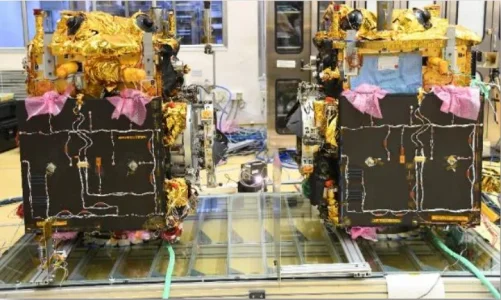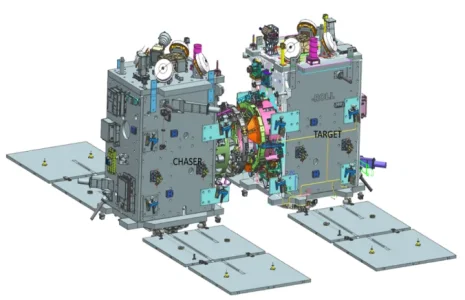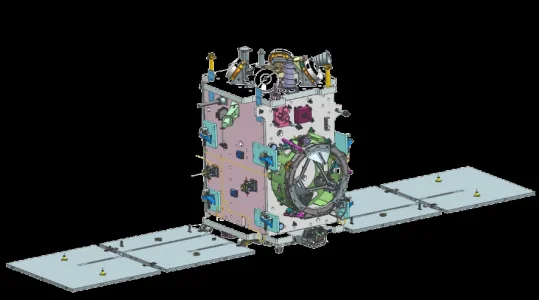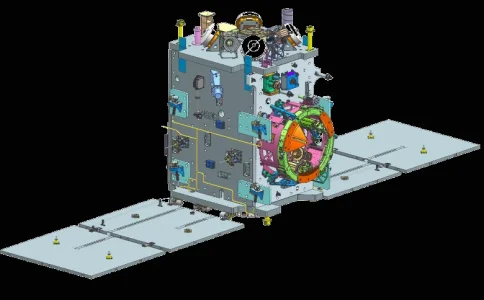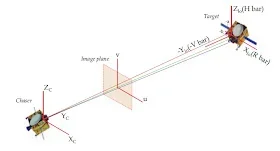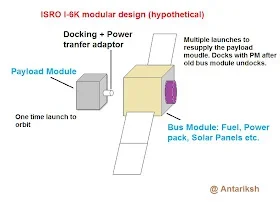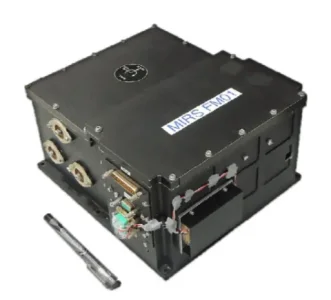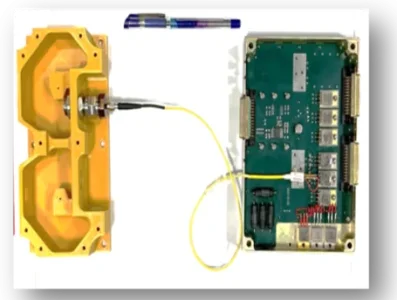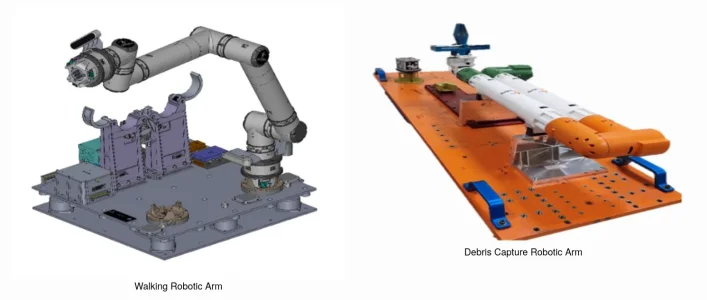SPADEX from ISRO page, link embedded.
Copyright: SRO
SpaDeX Mission
December 21, 2024
SpaDeX mission is a cost-effective technology demonstrator mission for the demonstration of in-space docking using two small spacecraft launched by PSLV. This technology is essential for India’s space ambitions such as Indian on Moon, sample return from the Moon, the building and operation of Bharatiya Antariksh Station (BAS), etc. In-space docking technology is essential when multiple rocket launches are required to achieve common mission objectives. Through this mission, India is marching towards becoming the fourth country in the world to have space docking technology.
Objectives:
The primary objective of the SpaDeX mission is to develop and demonstrate the technology needed for rendezvous, docking, and undocking of two small spacecraft (SDX01, which is the Chaser, and SDX02, the Target, nominally) in a low-Earth circular orbit. Secondary objectives include:
- Demonstration of the transfer of electric power between the docked spacecraft, which is essential for future applications such as in-space robotics,
- Composite spacecraft control, and
- Payload operations after undocking.
Mission Concept:
The SpaDeX mission consists of two small spacecraft (about 220 kg each) to be launched by PSLV-C60, independently and simultaneously, into a 470 km circular orbit at 55° inclination, with a local time cycle of about 66 days. The demonstrated precision of the PSLV vehicle will be utilized to give a small relative velocity between the Target and Chaser spacecraft at the time of separation from the launch vehicle. This incremental velocity will allow the Target spacecraft to build a 10-20 km inter-satellite separation with respect to the Chaser within a day. At this point, the relative velocity between the Target will be compensated using the propulsion system of the Target spacecraft.
At the end of this drift arrest maneuver, the Target and Chaser will be in the same orbit with identical velocity but separated by about 20 km, known as Far Rendezvous. With a similar strategy of introducing and then compensating for a small relative velocity between the two spacecraft, the Chaser will approach the Target with progressively reduced inter-satellite distances of 5 km, 1.5 km, 500 m, 225 m, 15 m, and 3 m, ultimately leading to the docking of the two spacecraft. After successful docking and rigidization, electrical power transfer between the two satellites will be demonstrated before undocking and separation of the two satellites to start the operation of their respective payloads for the expected mission life of up to two years.
New Technologies:
The indigenous technologies developed for enabling this docking mission are as follows:
- Docking mechanism,
- A suite of four rendezvous and docking sensors,
- Power transfer technology,
- Indigenous novel autonomous rendezvous and docking strategy,
- Inter-satellite communication link (ISL) for autonomous communication between spacecraft, incorporated with inbuilt intelligence to know the states of the other spacecraft,
- GNSS-based Novel Relative Orbit Determination and Propagation (RODP) processor to determine the relative position and velocity of the other spacecraft,
- Simulation test beds for both hardware and software design validation and testing.
In addition, SpaDeX, because of its small size and mass, is even more challenging due to the finer precision required for the rendezvous and docking maneuvers compared to docking two large spacecraft. This mission will be a forerunner for autonomous docking needed for future lunar missions like Chandrayaan-4 without the support of GNSS from Earth.
Docking Mechanism:
The docking mechanism is a low-impact docking system (approach velocity is in the order of 10 mm/s), androgynous (docking systems are identical for both spacecraft, Chaser & Target), and is a peripheral docking system (concept similar to the International Docking System Standard used by other agencies for human missions). The mechanism is smaller (450 mm) with one degree of freedom for extension and uses two motors compared to the IDSS (800 mm) on a hexapod with 24 motors. Multiple test beds were established to test the hardware and software simulation of the docking kinematics to verify and finalise the docking approach parameters.
Sensor Suite:
The additional sensor suite in this mission includes Laser Range Finder (LRF) and Corner Cube Retro Reflectors to work for a range of 6000 to 200 m for determining range (R). The set of Rendezvous Sensors (RS) is used in the range of 2000 to 250 m and from 250-10 m. RS provides the relative position (x, y, z) while LRF determines both relative position and velocity independently.
Proximity and Docking Sensor (PDS) provides relative position and velocity over a range of 30 m to 0.4 m. Laser Diodes (LDs) are used as targets for RS & PDS. A video monitor is used in the 20 to 0.5 m range and it will capture the video of the docking event. A Mechanism Entry Sensor (MES) is used from 8 cm to 4 cm to detect chaser entry into the target spacecraft during docking. Multiple test beds were used to calibrate and validate these sensors before accepting them for the mission.
ISL-Enabled GNSS-Based RODP:
Like all ISRO satellites in low-Earth orbit, both the SpaDeX spacecraft carry a differential GNSS-based Satellite Positioning System (SPS), which provides PNT (Position, Navigation, and Timing) solutions for the satellites. In SpaDeX, a novel RODP processor is included in the SPS receiver, which allows accurate determination of the relative position and velocity of the Chaser and the Target. By subtracting the carrier phase measurements from the same GNSS satellites in both Chaser and Target SPS receivers, highly accurate relative states of the two satellites are determined. The VHF/UHF transceivers in both satellites aid this process by transferring the GNSS satellite measurements from one satellite to the other. Hardware and software test beds, including closed-loop verifications, were carried out to characterise the RODP performance.
Rendezvous and Docking Algorithms:
Up to an inter-satellite distance (ISD) of 5 km, standard orbit maintenance and attitude control algorithms employed in ISRO LEO spacecraft are used. As the spacecraft are in circular orbit, and any addition or reduction of velocity to the satellites will result in orbit change, the V-bar strategy using n-Pulse, Glideslope and PV guidance algorithms are employed to reduce the ISD between the satellites, hold at fixed ISDs to evaluate the sensors and software, and finally docking. These algorithms were converted into software for achieving the rendezvous and docking. These software solutions were tested and validated in multiple digital, hardware-in-loop, onboard-in-loop, software-in-loop, and robotic simulations.
Post-Docking Activities:
After the docking and undocking events, the spacecrafts will be separated and used for application missions.
- A High-Resolution Camera (HRC) with a 4.5 m IGFOV and a swath of 9.2 x 9.2 km (snapshot mode) and 9.2 x 4.6 km (video mode) from a 450 km altitude is mounted in SDX01. This is a miniature version of the surveillance camera developed by SAC/ISRO.
- A Miniature Multi-Spectral Payload (MMX) is mounted in SDX02, developed by SAC/ISRO. This has four VNIR bands (B1/B2/B3/B4) at 450 nm to 860 nm and a 25 m IGFOV with a swath of 100 km from a 450 km altitude. The imaging is useful for natural resource monitoring and vegetation studies.
- A Radiation Monitor (RadMon) payload is mounted in SDX02, which will measure radiation dose encountered in space. This will help in generation of a radiation database for future Total Ionization Dosimeter (TID) and Single Event Upset (SEU) measurements for space science studies, with applications in human spaceflight.
Spacecraft Development:
The SpaDeX spacecraft were designed and realized by the UR Rao Satellite Centre (URSC) with the support of other ISRO centers (VSSC, LPSC, SAC, IISU, and LEOS). The spacecraft, in its orbital phase, will be controlled from ISTRAC using ISRO ground stations and other externally hired ground stations. The full integration and testing of the satellite were carried out at M/s Ananth Technologies, Bangalore, under the supervision of URSC. Presently, after completing all tests and clearances, the spacecraft has moved from URSC to SDSC and is undergoing preparations for launch.
